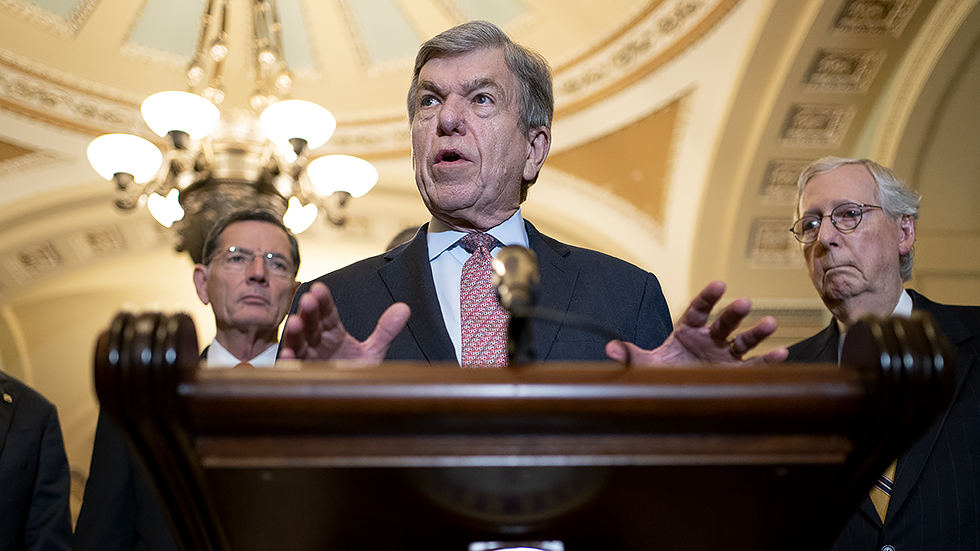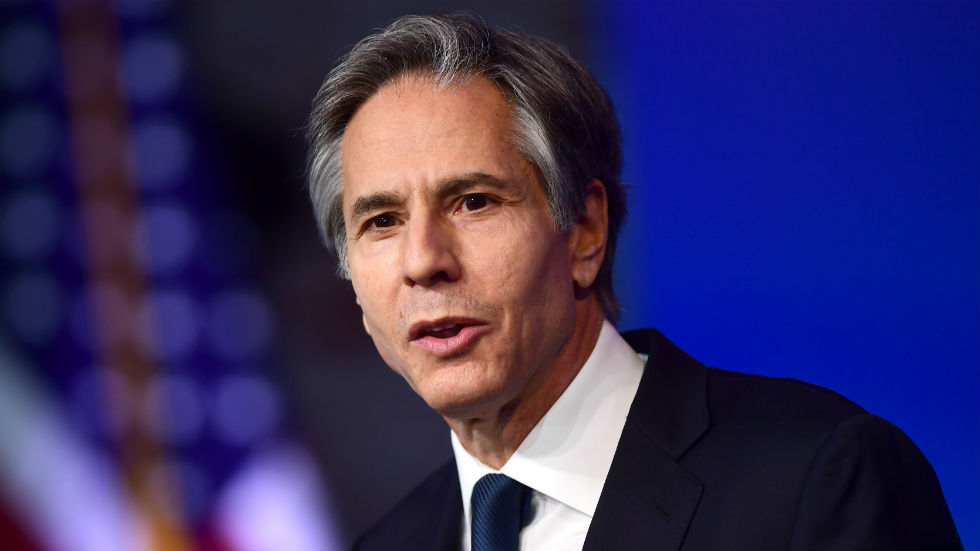Overnight Defense & National Security — Senate looks to break defense bill stalemate

It’s Wednesday, welcome to Overnight Defense & National Security, your nightly guide to the latest developments at the Pentagon, on Capitol Hill and beyond. Subscribe here: digital-stage.thehill.com/newsletter-signup.
Senate Republicans are moving toward an agreement to break a stalemate on a defense policy bill that has been stuck in limbo since Monday.
We’ll share details of the negotiations and what’s behind the holdup, plus more on growing tensions with Russia, and what the Air Force secretary is calling the new “arms race.”
For The Hill, I’m Ellen Mitchell. Write to me with tips: emitchell@digital-stage.thehill.com.
Let’s get to it.
GOP moving toward deal

GOP senators, leaving a closed-door caucus lunch, characterized negotiations as moving in the right direction and suggested votes on amendments to the massive National Defense Authorization Act (NDAA) could start later Wednesday, though that timeline wasn’t yet locked in.
“I think we’re getting close to an agreement on amendments tonight and tomorrow that would allow us to finish the NDAA tomorrow,” said Sen. Roy Blunt (Mo.), a member of GOP leadership.
A ‘couple holds left’: Sen. James Inhofe (Okla.), the top Republican on the Armed Services Committee, added he believed amendment votes could start on Wednesday and would carry over into Thursday.
Sen. Mike Braun (R-Ind.) added that Republicans were told that votes on more than 20 amendments could start “later this afternoon or early this evening.”
“Just a couple, three holds still left, which are probably going to be released if the amendments are granted. And that’s a lot closer than we were,” Braun added.
Hotline bling: Late Wednesday afternoon Senate leadership started a hotline — where they check with all 100 senators for potential objections — for a deal to vote on 25 amendments and to set up a vote on final passage of the defense bill, according to a Senate source.
The apparent progress is the latest twist for the defense bill, which has been stuck in limbo since Monday, when Republicans blocked it from getting the 60 votes needed to move forward.
Accusations: Republicans argued that Senate Majority Leader Charles Schumer (D-N.Y.) hadn’t given them an adequate number of amendment votes and accused him of trying to rush the debate. Leadership had tried to clear 18 amendments before the Thanksgiving recess but several GOP senators whose proposals weren’t included blocked that from happening.
Leadership then tried to clear a deal on Tuesday night that would have allowed for 21 amendment votes, including Nord Stream 2 sanctions, despite pushback from the Biden administration. The original 18 amendment package didn’t include that, sparking major frustration from Republicans who view the vote as a must-have.
A warning shot: But Sen. John Kennedy (R-La.) sent a warning shot against hopes of a quick deal on Wednesday morning, saying that at least three Republicans were blocking quick votes on the deal and that more were expected to do so. Aides and GOP senators said around noon that there were five GOP objections to the deal.
Blinken to meet with Russia, Ukraine

Secretary of State Antony Blinken said he will meet with Russian Foreign Minister Sergey Lavrov and Ukrainian Foreign Minister Dmytro Kuleba on Thursday as he gave some of the starkest comments yet on Moscow’s intentions to possibly invade Ukraine.
In a news conference after a meeting of NATO’s foreign ministers in Latvia on Wednesday, Blinken said he will meet with the diplomats at a summit of the Organization for Security and Cooperation in Europe.
Timing: The meeting comes as the U.S. and NATO warn that Russia may be planning to invade Ukraine, as it did before annexing the Crimean Peninsula in 2014.
A stark warning: Blinken warned that Russia has “stepped up planning for potential military action in Ukraine, including positioning tens of thousands of additional combat forces near the Ukrainian border.”
“We don’t know whether President [Vladimir] Putin has made the decision to invade,” he continued. “We do know that he is putting in place the capacity to do so on short order should he so decide.”
Blinken added that the U.S. would responds “resolutely” to any effort to destabilize Ukraine, “including with a range of high impact economic measures that we have refrained from using in the past.”
Other affirmations: Wednesday marked the conclusion of NATO’s two-day foreign ministers meeting. On Tuesday, several of the ministers affirmed that the alliance would stand behind Ukraine amid any Russian efforts to destabilize the country.
NATO Secretary General Jens Stoltenberg also warned that “there will be a high price to pay” if Russia uses force against Ukraine.
Russia’s response: Russia has insisted that its military movements have been defensive and that Kyiv had aggressive intentions. Most recently, Moscow said that Ukraine had deployed half of its troops to the border between the two countries.
Putin said Wednesday that Moscow would seek “reliable and long-term security guarantees” from the U.S. and allies, including agreements to prevent NATO forces moving east and weapons being deployed in close vicinity to Russia, The Associated Press reported.
Read the rest of the story here.
MORE STORIES ON THIS FROM THE HILL
-
Kremlin points to Ukrainian forces near border, says Russia can’t deescalate
-
Ukraine calls on NATO to prepare sanctions for possible Russian invasion
-
Putin looking for guarantees NATO won’t expand westward
Oversight GOP wants records on withdrawal
In a letter to the White House, Pentagon and State Department, GOP members of the committee indicated an interest in a variety of issues stemming from the withdrawal, from American citizens and residents left behind in the evacuation to the U.S. military equipment now in the hands of the Taliban.
“It is Congress’ duty to review the decisions that led to this national security and humanitarian crisis. The American people deserve to know how the Biden Administration planned for and executed the withdrawal from Afghanistan, as well as the chaotic evacuations after the Taliban took control of Kabul,” ranking member James Comer (R-Ky.) wrote in the letter to President Biden, Secretary of State Antony Blinken and Defense Secretary Lloyd Austin.
What this signals: The U.S. government already has to follow record preservation requirements laid out by law, which obligate the government to retain most documents. The letter makes a request to ensure that federal contractors and consultants likewise preserve records.
But the request more broadly signals continuing Republican interest in Afghanistan and the potential for wide ranging investigations if the GOP wins back the House majority next November.
Some context: Biden continued a withdrawal from Afghanistan first negotiated under the Trump administration. The chaotic process ended with the U.S. evacuating nearly 130,000 people from the country, but leaving behind many allies who assisted in the 20-year American involvement in Afghanistan.
US in hypersonic ‘arms race’ with China

Air Force Secretary Frank Kendall says the United States is in an “arms race” with China for developing hypersonic weapons.
In an interview with Reuters, Kendall said the arms race is “not necessarily for increased numbers, but for increased quality.”
“It’s an arms race that has been going on for quite some time,” he continued. “The Chinese have been at it very aggressively.”
On edge: Washington has been on edge since the Pentagon confirmed that China had conducted a hypersonic weapons test over the summer.
Gen. John Hyten, vice chairman of the Joints Chiefs of Staff, told CBS News last month that China launched a “long-range missile” which “went around the world, dropped off a hypersonic glide vehicle that glided all the way back to China, that impacted the target in China.”
Hypersonic weapons fly at roughly 3,850 miles per hour, or more than five times the speed of sound.
ON TAP FOR TOMORROW
- Secretary of State Antony Blinken will attend the Organization for Security and Cooperation in Europe Ministerial Council in Stockholm, where the ministers “will discuss concerns about the Europe-Eurasia region’s security environment and the need to strengthen it through upholding OSCE principles,” according to the State Department. Blinken also will meet with Swedish officials and his Russian counterpart.
- The Brookings Institution will host a conversation on “North Korea in a New Era of U.S.-South Korea Partnership,” at 8:30 a.m.
- National Counterterrorism Center Director Christine “Christy” Abizaid will speak at an Intelligence and National Security Alliance event at 9 a.m.
- The United States Institute of Peace will hold a discussion on “Learning from U.S.-Vietnam Cooperation on Wartime Remains Recovery,” at 9 a.m.
- The House Transportation and Infrastructure Committee will hold a hearing on “The Evolving Cybersecurity Landscape: Federal Perspectives on Securing the Nation’s Infrastructure,” at 10 a.m.
WHAT WE’RE READING
-
Proposal to move defense bill running into new GOP objections
-
Russia ordering some US Embassy staff to leave Moscow amid diplomatic spat
-
Iran enriching uranium with advanced centrifuges, watchdog says
-
China rips Abe after former Japanese leader’s remarks about Taiwan
-
Top US, EU diplomats to sync up strategy in confronting China
-
Senate nearing deal on defense bill after setback
-
Reuters: Biden administration turns focus to space as rivals China, Russia loom
-
The Associated Press: US, SKorea to bolster alliance at talks but questions remain
That’s it for today! Check out The Hill’s defense and national security pages for the latest coverage. See you Thursday.
Copyright 2023 Nexstar Media Inc. All rights reserved. This material may not be published, broadcast, rewritten, or redistributed. Regular the hill posts







